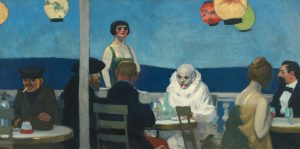
This week I have decided to write about “Soir Bleu” by Robert Olen Butler. Butler starts off with the setting of a hotel lobby where three people are the center plus a peculiar clown, Pierott, who is later revealed to only be seen by the narrator. There is a deal to be made on one of the narrator’s paintings to Colonel Leclerc who is more interested in the narrator’s muse, Solange, who is also his lover, than anything else being offered to him. Right away it was easy to sense the underlying suspense that Butler was trying to portray here, which made the story interesting to read in hopes of finding out what was next. The richest part of the story is what comes from the narrator’s interaction with Pierott.
In the beginning they communicate with no words, understanding each other with just hand gestures. Butler gives them a sense of familiarity with each other without fully describing it at first. In any normal circumstance a clown appearing magically at your table would be unsettling for many, but it seemed to have no real effect on the narrator. He reveals that he has in fact seen Pierott before, maybe not the exact actor, but he has seen the show, and he recalls that memory even though he knows he shouldn’t and how hard it will be for him. While revisiting that memory, he remembers his father:
I have not listened to myself speaking to the Pierott of this veranda in Nice, but I hear myself suddenly fall silent with him. And in that theater in Valvins, as Columbina dies, I enter another pantomime beside me. I turn my head to look at my father. His muscled bulk. His drunkard’s bloated red nose. His vast, pocked red nose. But a smart man, for all that. A dealer in bonds. Even a refined man. My father frightens me and he enchants me.
After this it is revealed that after that night the narrator never saw his father again.
That night at the theater is the last time I will ever see my father. The next day my mother is dead, her neck snapped. And he has vanished.
The underlying suspense that Butler captures us with in the beginning is now back as we discover that the narrator’s father has killed his mother. It brings our attention back to Colonel Leclerc and Solange, who are discovered to be having an affair. The Colonel blames it on Solange, only saying that she seduced him, and he rushes out of the room, leaving the two together. The narrator kills Solange only to be met by Pierott again as they now look at her dead body.
Pierott is standing barely an arm’s length before me. His face is solemn. He nods once more and raises his right hand and it pauses at the base of his throat, and he grasps something, and now his hand is rising and the whiteness is rising with it. More. It is his skin, his flesh rising, and the bones of his neck are emerging and now the chin of a skull, and higher his hand goes, passing upward, and the skull’s teeth appear and the bones of cheek and lip and now a fleshy nose emerges, preserved in this skull, and in one final stroke he rips off the rest of the clown’s face and all is gray bone and empty eye socket. All but the nose, which remains uncorrupted by the grave. A drunkard’s bloated red nose. A vast, pocked red nose. As skulls are apt to do, it is smiling. I cannot share the smile. “Father” I say, “What have we done.”
Butler showcased perfectly the effects of trauma from a young age and the way that generation cycles and repeating cycles can come into play. The narrator repeated the same action of the man that frightened him and stole his innocence at such a young age. He didn’t repeat these actions because he admired him, but because that was all he knew to do at the time. Now he has become the thing that was haunting him and the man that he hated which is truly a punishment worse than death itself.
I think it is brilliant how you connected what happened to generational cycles. These cycles are so apparent in so many lives. We do really get a first hand look on turning into something that you wished you never would. “That’s all he knew.”